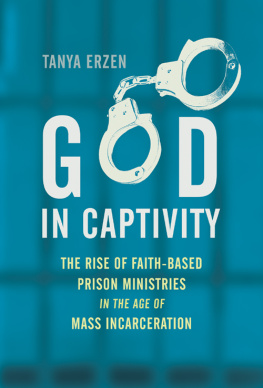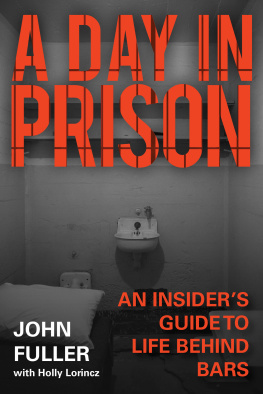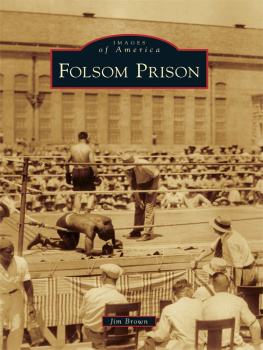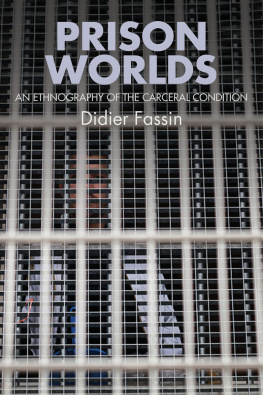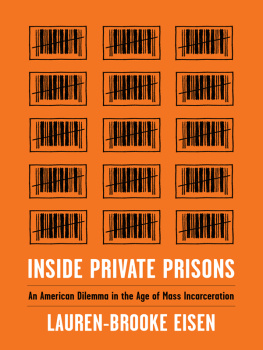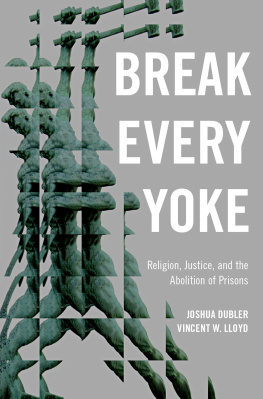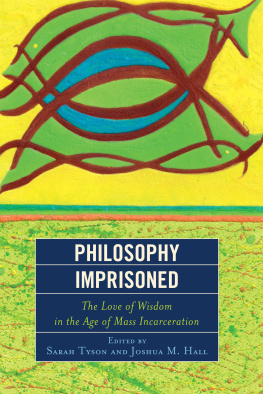Contents
Guide
Pagebreaks of the print version
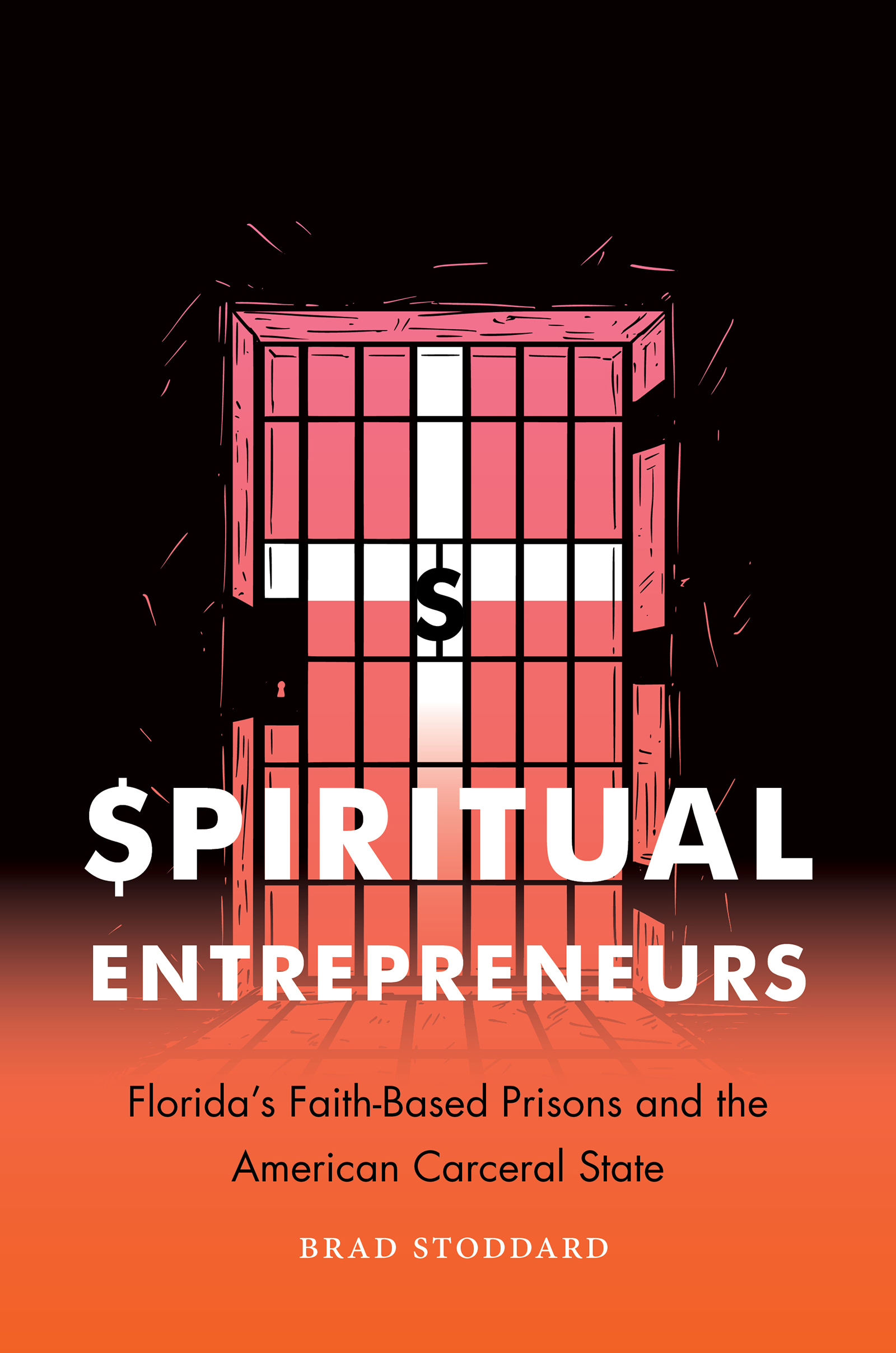
Spiritual Entrepreneurs
Where Religion Lives
Kristy Nabhan-Warren, editor
Where Religion Lives publishes ethnographies of religious life. The series features the methods of religious studies along with anthropological approaches to lived religion. The religious studies perspective encompasses attention to historical contingency, theory, religious doctrine and texts, and religious practitioners intimate, personal narratives. The series also highlights the critical realities of migration and transnationalism.
Spiritual Entrepreneurs
Floridas Faith-Based Prisons and the American Carceral State
BRAD STODDARD
The University of North Carolina PressChapel Hill
This book was published with the assistance of the Anniversary Fund of the University of North Carolina Press.
2021 The University of North Carolina Press
All rights reserved
Set in Charis by Westchester Publishing Services
Manufactured in the United States of America
The University of North Carolina Press has been a member of the Green Press Initiative since 2003.
Library of Congress Cataloging-in-Publication Data
Names: Stoddard, Brad, author.
Title: Spiritual entrepreneurs : Floridas faith-based prisons and the American carceral state / Brad Stoddard.
Other titles: Where religion lives.
Description: Chapel Hill : The University of North Carolina Press, [2021] | Series: Where religion lives | Includes bibliographical references and index.
Identifiers: LCCN 2020038285 | ISBN 9781469663074 (cloth) | ISBN 9781469663081 (paperback) | ISBN 9781469663098 (ebook)
Subjects: LCSH: Church work with prisonersFlorida. | Prisoners Religious lifeFlorida. | CriminalsRehabilitationFlorida. | Faith-based human servicesFlorida. | EvangelicalismFlorida.
Classification: LCC BV4465 .S76 2021 | DDC 365/.34dc23
LC record available at https://lccn.loc.gov/2020038285
Cover illustration: Drawing of prison door iStock.com/Zdenek Sasek.
For Stacy Lane Stoddard
Contents
Acknowledgments
Almost a decade has passed since I first learned about Floridas faith- and character-based correctional institutions (FCBIs) and since I first directed my attention to this project. Since then, I have interacted with numerous people who offered support, time, patience, and insights to help make this book possible.
My mentors at Florida State University (FSU) have been with me since this topic first caught my attention, and I would like to thank Amanda Porterfield, John Corrigan, Michael McVicar, and Martin Kavka for offering feedback, direction, and criticisms at multiple stages in this project. I would also like to thank my dear friend Stephen Tripodi (mentor, conversation partner, and drinking buddy) from FSUs College of Social Work and his amazing family. My colleagues from FSU continue to inspire me with their intellectual curiosity, work ethics, and critical insights. I am particularly grateful to Tara Baldrick-Morrone, Cara Burnidge, Emily Suzanne Clark, Mike Graziano, and Adam Park.
As I worked on and refined this book, I benefited from the feedback I received at a couple dozen conferences where I presented my research on FCBIs, including conferences at the American Academy of Religion, the American Historical Association, the American Society of Church History, the John C. Danforth Center for Religion and Politics, the Society for the Scientific Study of Religion, and various colleges and universities. My work benefited from feedback I received from formal respondents but also from fellow panelists who either modeled scholarship or directly commented on my work.
While I have not presented my work on FCBIs at a meeting of the North American Association for the Study of Religion (NAASR), the colleagues I met primarily through my association with NAASR helped me in numerous ways. Chief among them are Craig Martin, who read various versions of this book and who provided important feedback, and Russell McCutcheon, who challenged me to think about the sociopolitical work that results from socialization efforts in FCBIs. I would also like to thank all the members of NAASRs executive committee, particularly Dennis LoRusso, who read some of the manuscript and who always pushed me to identify my terms in clear and accessible language. My term as NAASR president is approaching its end, but it has been a joy to work with Rebekka King (vice president) and Martie Smith Roberts (executive secretary and treasurer) over the past three years. Former NAASR president Greg Alles deserves special thanks for his guidance, advice, and everything he did both for me and for the Religious Studies department at McDaniel College.
Researching this project took me to prisons across the State of Florida, but I also conducted archival research in several locations where archivists and librarians proved to be generous and patient. I am particularly indebted to the staff at the Southern Baptist Convention Historical Library and Archives for their generous research grant and for making me feel welcome while I researched in their archives. I also extend my appreciation to the staff at the State Archives of Florida and to Jim Baggett from the Birmingham Public Library. I would also like to thank the American Academy of Religion, Florida State University, and McDaniel College for funding this research.
The bulk of this book relies on ethnographic research I conducted in Floridas Department of Corrections (DOC). Without the DOCs help, this book literally would not exist. Retired former secretary Louie Wainwright is a legend of sorts in the world of corrections, and after searching the state of Florida, I found him living in a retirement community not far from me. After spending countless hours in archives and researching public DOC documents online, I developed a history of the DOC and an opinion of Wainwright, and my project benefited tremendously as I talked to Wainwright about his tenure as head of Floridas DOC and about the history of the DOC itself. I am also grateful to the DOC staff for allowing me to research in Floridas FCBIs. Most people try to stay out of prison, but I wanted desperately to get in. I thought this project died when the DOC declined my initial request to research inside its prisons; however, with the help and support of former DOC secretary Michael Crews and former Head Chaplain Alex Taylor, the DOC approved my second research proposal, and with few exceptions, the DOC staff has since been fantastic to work with. I specifically want to thank all the wardens, assistant wardens, correctional officers, classification officers, chaplains, and other DOC employees who supported my research. I am particularly grateful to Warden James Coker and Chaplain Steve Fox from Wakulla Correctional Institution (CI) for granting me unprecedented access to research in Wakulla CI. It was serendipitous that the worlds largest faith-based correctional facility was only a half hour from my home, but without the support of Crews, Taylor, Coker, and Fox, it would not have mattered.
This project also benefited from the volunteers (particularly Allison DeFoor, Ike Griffin, Hugh MacMillan, and Bob and Mary Rumbley) who shared their stories and made me feel welcome in their classes, homes, reentry facilities, coffee shops, and other places we interacted. Floridas faith-based correctional facilities would not exist without the support of volunteers, and without their stories, this project would be incomplete.



